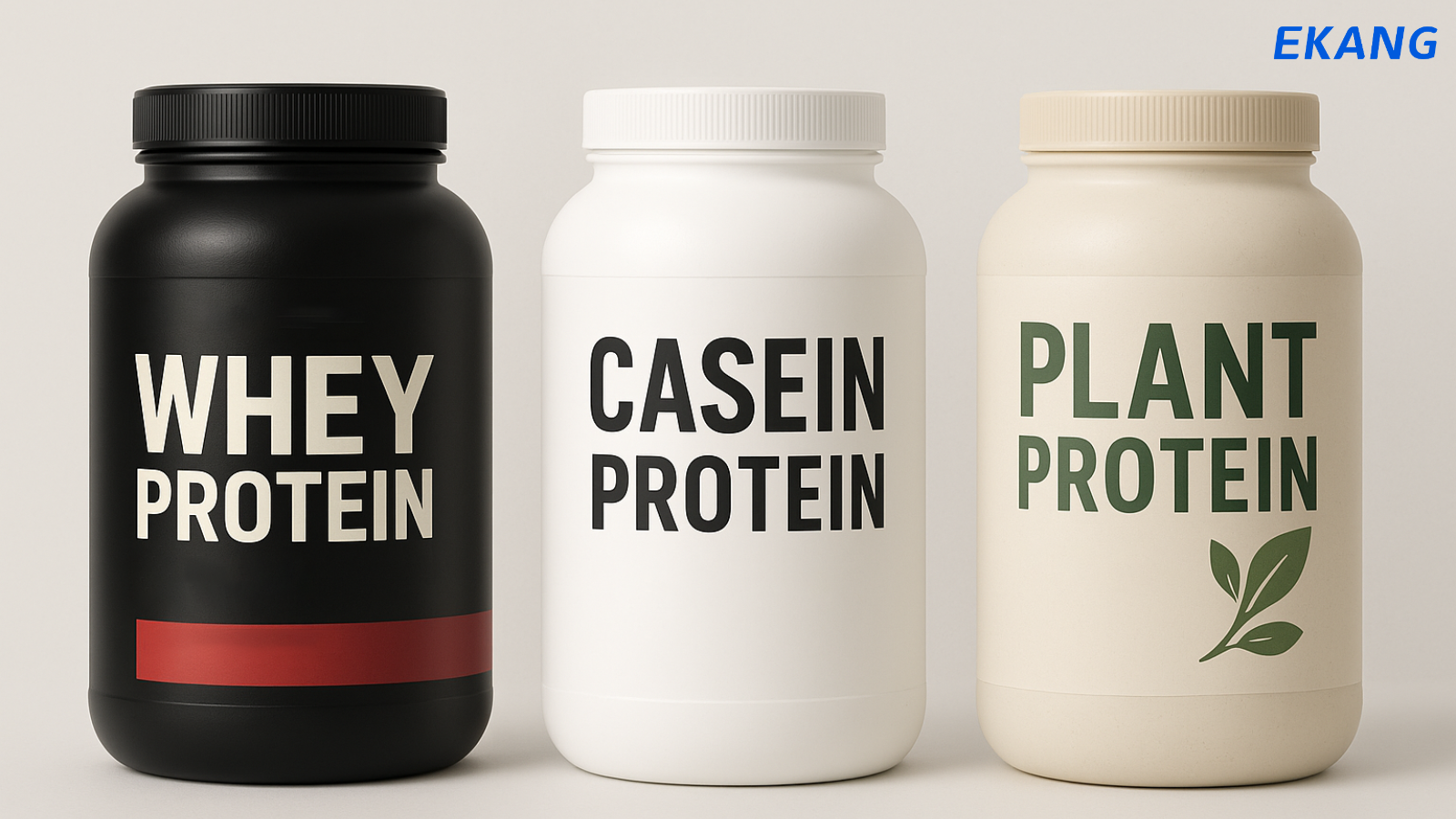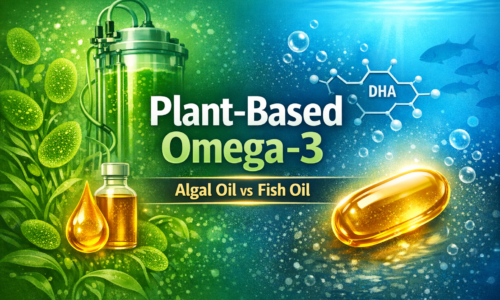
Protein is one of the most essential nutrients for building and maintaining muscle, supporting recovery, and keeping you feeling full between meals. Whether you are strength training, trying to lose weight, or simply looking to improve your nutrition, choosing the right protein powder can make a huge difference.
However, with so many options on the market—whey protein, casein protein, and plant-based protein—which one truly suits your physique and goals? As professional protein supplement manufacturers, we will delve into the differences between these three to help you make an informed choice based on your personal objectives.
What is Whey Protein?
Whey protein is a high-quality, complete protein extracted from milk. It is a byproduct separated from the liquid portion of the cheese production process. It contains all nine essential amino acids and is particularly rich in branched-chain amino acids (BCAAs), such as leucine, which directly promote muscle protein synthesis.
Benefits of Whey Protein
- Complete Amino Acid Profile: Contains all essential amino acids, with a high proportion of branched-chain amino acids (BCAAs), especially leucine, which significantly promotes muscle synthesis.
- Fast Absorption: Rapidly absorbed from the gastrointestinal tract within approximately 30–60 minutes after ingestion, making it suitable for immediate post-workout consumption.
- High Biological Value: A biological value (BV) close to or exceeding 100 indicates that the body utilizes it very efficiently.
Common Forms:
- Whey Protein Concentrate (WPC): Protein content is approximately 30%–80%, retaining some lactose and fat.
- Whey Protein Isolate (WPI): Protein content is ≥90%, with very low lactose and fat content, making it suitable for those with lactose intolerance.
- Whey Protein Hydrolyzed (WPH): Partially hydrolyzed, resulting in a smaller molecular weight and faster absorption, but also more expensive.
Who is it best for?
- Fitness enthusiasts seeking muscle growth and improved athletic performance.
- On-the-go individuals seeking a quick and convenient protein source.
Potential drawbacks: Whey contains a small amount of lactose. If you’re lactose intolerant, opt for whey protein isolate (WPI)—it has most of the lactose removed, making it easier to digest.
What is Casein Protein?
Casein protein also comes from milk, but unlike whey, it’s absorbed very slowly. It forms a gel-like structure in the stomach, continuously releasing amino acids for up to 6–8 hours.
Benefits of Casein Protein
- Long-release: Provides continuous nutrition to muscles even when sleeping or fasting.
- Increases satiety: Helps control appetite, making it ideal for fat loss.
- Prevents muscle breakdown: Especially suitable for those with long intervals between workouts.
Potential Disadvantages: Slow absorption, making it unsuitable for immediate post-workout consumption; contains lactose, making it unsuitable for those with lactose intolerance.
Who is it best for?
- Serious trainees who focus on overnight recovery and preventing muscle breakdown.
- Those who need to control their weight and appetite.
What is Plant Protein?
Plant protein refers to proteins derived from plant tissues and is primarily found in legumes, grains, nuts, seeds, and certain vegetables. With the rise of vegetarianism and environmental awareness, plant protein powders have become a popular choice.
Benefits of Plant Protein
- Lactose-free and hypoallergenic: Suitable for those with lactose intolerance, allergies, or vegetarianism.
- Multi-nutrient: Rich in dietary fiber, vitamins, minerals, and healthy plant compounds (such as antioxidants), it is typically low in fat and saturated fatty acids.
- Easy to digest: Generally gentler and more friendly to sensitive stomachs.
- Environmentally friendly: Carbon emissions and water consumption during production are generally lower than those of animal protein.
Points to note:
Compared to animal protein, the amino acid profile of plant protein often lacks one or more essential amino acids (such as lysine and methionine). Therefore, a combination of plant sources (such as legumes and grains) is often needed in the diet to complement the amino acid profile and ensure a complete intake of essential amino acids.
Who is it best for?
- Vegetarians, those with lactose intolerance, or those with milk allergies.
- Consumers pursuing a natural, sustainable lifestyle.
- People who have difficulty digesting animal protein.
Whey vs. Casein vs. Plant Protein
| Feature | Whey Protein | Casein Protein | Plant Protein |
| Absorption Rate | Fast | Slow | Medium |
| Protein Quality | High (Complete Protein) | High | Varies by Blend |
| Satiety (Fullness) | Moderate | High | Moderate |
| Contains Lactose | Yes (Isolates are low) | Yes | No |
| Best For | Muscle building, post-workout | Weight loss, nighttime consumption | Vegetarians, lactose intolerance |
| Price Range | Medium | Medium | Medium to Slightly Higher |
How to Choose a Protein Powder for Different Goals?
For muscle building: Choose whey protein powder. It absorbs quickly and is high in branched-chain amino acids, effectively promoting muscle growth.
For fat loss: Choose casein or a blended protein powder. These can help delay hunger and reduce calorie intake.
For vegetarians or those with lactose intolerance: Choose plant-based protein powder or whey protein isolate (WPI).
For a balanced daily supplement, you can combine your protein powders based on the time of day:
- Whey protein after exercise
- Casein before bed
- Plant-based protein for breakfast or as a meal replacement
FAQ
Q1: What is the difference between whey protein and casein?
Whey protein is quickly absorbed and suitable for post-workout consumption; casein is slowly absorbed and suitable for nighttime consumption or when fasting for extended periods.
Q2: Can plant-based protein help build muscle?
Yes. As long as they’re used in the right combination (e.g., pea and rice protein), plant-based protein can also support muscle synthesis.
Q3: Which type of protein is best for a weight loss diet?
Casein is more filling, helping to control calorie intake and prevent muscle loss.
Q4: Can I drink whey protein if I’m lactose intolerant?
You can choose whey protein isolate (WPI) or plant-based protein powder, which are virtually lactose-free.
Considering Launching Your Own Protein Supplement Brand?
If you are thinking about creating a high-quality protein powder or nutritional supplement brand, Ekang Nutra can be your trusted manufacturing partner. We specialize in providing complete, end-to-end solutions, from concept development to product launch, helping brands enter the market quickly and steadily. Contact us immediately to learn more about our detailed plans for Protein Supplement Customization and Manufacturing Services.









